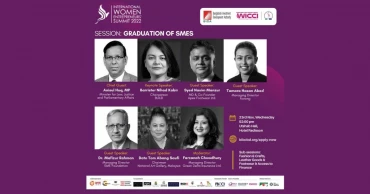BIBC
BIBC-WICCI Awards 2022 Event: Graduation of SME Session Overview
Bangladesh India Business Council (BIBC), Women's Indian Chamber of Commerce & Industry (WICCI), and Bangladesh Investment Development Authority (BIDA) organized the International Women Entrepreneur’s Summit 2022 on the 23rd and 24th of November. The annual summit aims to champion women's entrepreneurship and focus on the bilateral commercial ties between Bangladesh and India. As part of recognizing female excellence in business and industry, BIBC-WICCI recently held its excellence awards for 2022 at Hotel Radisson.
The award was given to exceptional women and organizations in championing female contribution and growth in several streams. This year’s theme focused on education and skill development, young innovators, fashion and arts, business and SMEs, health, and public service.
Read More: Find foreign partners for technology transfer, PM tells businessmen
BIBC – WICCI honored 7 international female entrepreneurs along with 14 Bangladeshi companies and female leaders in their respective streams.
Uzma Chowdhury, Managing Director of RFL, Rupali Chowdhury, CEO of Berger Paints, and Shopna Bhowmik, Regional head of Marks and Spencers India and Bangladesh, were awarded as the Outstanding Women in Business.
One of the main sessions of the summit focused on the graduation of SMEs. Farzanah Chowdhury, Managing Director of Green Delta Insurance Ltd, moderated the session. The keynote speaker for the session was Barrister Nihad Kabir, Chairperson of BUILD. The guest speakers for the session were Syed Nasim Manzur, MD, and Co-founder of Apex Footwear Ltd; Tamara Hasan Abed, Managing Director, Aarong; Dr. Mafizur Rahman, managing Director SME Foundation and finally, Dato Tom Abang Saufi, Chairman of the National Art Gallery, Malaysia.
Read More: Despite Tk 2000cr credit guarantee, only Tk 192cr loan disbursed to CMSMEs
The overarching theme of the session was the overall condition of SMEs and the role of Women in it. The guest speakers also shared their ideas about the challenges faced by women in their respective industries.
The session started with the keynote speech from Barrister Nihad Kabir. She presented the overall scenario where the cottage, micro, and small CMSMEs contribute over 25% of the GDP, 45% of the manufacturing GDP, 75% of export earnings, and over 87% of industrial employment.
Yet there seems to be a disproportion of incentives and loans provided to the CMSMEs compared to the medium and large enterprises. What was even more surprising is that out of the 8 million CMSMEs in Bangladesh, only 8% are owned by women, which is the lowest in South Asia.
Read More: 'ONDC to play key role in business development of online SMEs'
Barrister Nihad Kabir identified two main constraints for such a disproportion of initiatives and ownership -the documentation and ownership procedure and the financing opportunities.
By definition, the ownership of a CMSME doesn’t have to be the same as the one holding the trade license for the business. But the tendency of financial organizations to treat the trade license as proof of ownership and a general archaic tendency to divert female loans has only made the situation grave.
Then the discussion brought the second issue to light: access to financing opportunities. Very recently, there has been a policy initiative by Bangladesh Bank to segregate the medium industry from the CMSMEs. This move has allowed CMSMEs to access better loan disbursement. Currently, only about 7 to 8% loans are disbursed to female-owned SMEs.
Read More: MSMEs: Experts want realistic steps taken to enhance service quality, business development
Ms. Kabir also pointed out that because of the documentation-related hassle, 63% of the female entrepreneurs solely rely on their personal savings to start a business with the MFI, and the banks make up only 24%. She also identified that banks and NBFIs should be more inclined to disburse female entrepreneurial loans. Specialized financial institutions should also be set up along with direct lending and PPP to enhance the existing structure better.
Syed Nasim Manzur, while sharing insight into the footwear and leather industries, pointed out that women are interested in starting ventures in the leather industries. However, the hassles of documentation and an archaic male-dominated mindset in the industry are strong barriers along with the financial aspect.
He also emphasized the need to develop technical know-how about the leather and footwear industry before diving into it. Mr. Manzur also pointed out several regulatory shortcomings where an export contractor like Apex cannot utilize the small up-and-coming SME ventures because of outdated customs, VAT, and financing rules. He pointed out these are creating a barrier to the growth and scalability of female-led ventures in the footwear industries.
Read More: '91% SMEs don't get bank loans'
Tamara Hasan Abed focused more on the financing aspect through BRAC. BRAC bank has been a pioneer in providing loans to CMSMEs, especially the ones led by Aarong. Aarong, through its several sub-brands, has enabled and empowered rural CMSMEs and is continuing its stride in ethical growth.
Dr. Rahman and Ms. Saufi also chimed in on the need for financial restructuring and a change of mindset in enabling women in CMSMEs. The need for documentation reform and better access to equitable funding like impact funds and venture capitalization should also be streamlined to finance the female-led CMSMEs.
BIBC-WICCI Awards 2022 Event's Graduation of SME Session concluded with the interaction between the guest speakers and the participants. The speakers explored several of the established constraints and how they affect individual industries and even on the micro initiative level.
Read More: BCI, SME Foundation tie up for capacity building of small, medium industries
3 years ago

